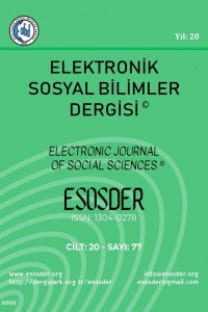TÜRKİYE'DE ÖZEL TÜKETİM VERGİSİ VE CARİ AÇIK ARASINDAKİ İLİŞKİNİN ANALİZİ
Ülkelerin makroekonomik performanslarının değerlendirilmesinde, cari işlemler açığı önemli bir ölçüt olarak karşımıza çıkmaktadır. Özellikle gelişmekte olan ülkelerde, ithalat artışına bağlı olarak ortaya çıkan dış ticaret açığı ve cari açık temel makro ekonomik sorunlar arasındadır. Cari açık arttıkça özel tüketim vergi gelirlerinin artması (ithalat artışından dolayı) söz konusu olabilir. Öte yandan özel tüketim vergileri (ÖTV), ithalatı azaltmak için kullanıldığında cari açığı gidermekte kullanılan bir politika aracı olarak da düşünülmektedir. Bu kapsamda çalışmanın amacı, Türkiye'de 2005:1-2013:9 zaman aralığı için özel tüketim vergi gelirleri ile cari açık arasındaki ilişkinin varlığını Granger Nedensellik Testi ile analiz etmektir. Ampirik bulgular, ÖTV gelirlerinden cari açığa ve cari açıktan ÖTV gelirlerine doğru nedenselliğin varlığını ortaya koymaktadır.
Anahtar Kelimeler:
Özel Tüketim Vergisi, Cari Đşlemler Açığı, Standart Granger Nedensellik Testi
ANALYSIS OF THE RELATIONSHIP BETWEEN SPECIAL CONSUMPTION TAX AND CURRENT ACCOUNT DEFICIT IN TURKEY
In the evaluation of the macroeconomic performance of the countries, the current account deficit is an important criterion. Especially in developing countries, the foreign trade deficit and current account deficit caused by the increase in imports are among the major macro-economic problems. Increasing the current account deficit, cause of the growing in special consumption taxes revenues, may be due to the increase in imports. On the other hand, it is also considered as a policy tool that special consumption taxes revenues used to reduce imports and resolve the current account deficit. In this context, the purpose of the study is to analyse the existence of the relationship between the current account deficit and special consumption tax revenues in Turkey for 2005:1-2013:9 period by using Granger Causality Test. The empirical findings reveal the presence of bi-directional causality between variables.
___
- Abell, J. D. (1990). Twin Deficits During The 1980’s: An Empirical Investigation. Journal of Macroeconomics, 12, 81-96.
- Afonso, A., Rault, C. (2009). Budgetary And External Imbalances Relationship: A Panel Data Diagnostic. Cesifo Working Paper, No: 2559, 1-38.
- Darrat, A. F. (1988). Have Large Budget Deficits Caused Rising Trade Deficits?. Southern Economic Journal, 54(4), 879-887.
- Enders, W., Lee, B. S. (1990). Current Account and Budget Deficits: Twins or Distant Cousins?, The Review of Economic and Statistics, 71, 373-381.
- Engle, R.F., Granger, C.W. (1987). Co-integration and Error Correction: Representation, Estimation and Testing, Econometrica, 55(2), 251-276.
- Granger, C.W. (1969). Investigating Causal Relations by Econometric Models and CrossSpectrai Methods. Econometrica, 37(3), 424-438.
- Kalou, S., Paleologou, S. M. (2012). The Twin Deficits Hpothesis: Revisiting an EMU Country. Journal of Modeling, 34, 230-241.
- Mann, C. L. (2002). Perspectives On The U.S. Current Account Deficit And Sustainability. The Journal of Economic Perspectives, Volume: 16, No: 3, 131-152.
- Mukhtar, T., Zakaria, M., Ahmed, M. (2007). An Empirical Investigation for The Twin Deficits Hypothesis in Pakistan, Journal of Economic Cooperation, 28(4), 63-80. ÖTV Kanunu, 12.06.2002 tarih ve 4760 sayılı Özel Tüketim Vergisi Kanunu.
- Pehlivanoğlu, F., Besel, F. (2013). Relationship Between Foreign Trade Deficit and Special Consumption Revenues With Structural Breaks in Turkey. Journal of Economics and Sustainable Development, Vol: 4, No: 17, 63-72.
- Uğur, A., Akbaş, Y.E., Şentürk, M. (2012). Özel Tüketim Vergisi Oranlarındaki Artış Cari Açığa Çözüm Olabilir mi?. Journal of Yasar University, 26(7), 4572-4588.
- Winner,L.E. (1993). The Relationship of The Current Account Balance and The Budget Balance. The American Economist, 37(2), 78-84.
- Yılmaz, E. B. (2002). Đkiz Açık Teorisi: Türkiye’nin 1980-2001 Dönemi Bütçe Açıkları ve Dış Ticaret Açıkları Üzerine Bir Nedensellik Araştırması. Đ.Ü. Đktisat Fakültesi Maliye Araştırma Merkezi Konferansları, 41. Seri, 139-152.
- Zengin, A. (2000). Đkiz Açıklar Hipotezi (Türkiye Uygulaması). Gazi Üniversitesi Ekonomik Yaklaşım Dergisi, 11 (39), 37-67. www. gib.gov.tr www. tcmb.gov.tr http://www.bumko.gov.tr/Eklenti/7704,merkezi-yonetim-butce-gelirleri-2006-2012-kesinhesap.xls?0, (Erişim: 17.10.2013).
- ISSN: 1304-0278
- Yayın Aralığı: Yılda 4 Sayı
- Başlangıç: 2002
- Yayıncı: Cahit AYDEMİR
Sayıdaki Diğer Makaleler
ECZANE ÇALIŞANLARI TARAFINDAN KULLANILAN E-REÇETE SİSTEMİ BAŞARISININ ÖLÇÜLMESİ
EĞİTİM DENETMENLERİNİN MESLEKİ GELİŞİM, TÜKENMİŞLİK ve İŞ DOYUMUNA İLİŞKİN BİR META-SENTEZ ÇALIŞMASI
FÜTÜRİZM'İN MÜZİĞE ETKİLERİ VE YENİ ÇALGILAR
NON-LINEAR MARKET BEHAVIOR AT THE ISTANBUL STOCK EXCHANGE
BABA KATILIM ÖLÇEĞİ'NİN (BAKÖ) GELİŞTİRİLMESİ
EVALUATION OF INTERDISCIPLINARY TEACHING APPROACH IN GEOGRAPHY EDUCATION
Mustafa SAĞDIÇ, Hilmi DEMİRKAYA
Hüseyi Fazlı ERGÜL, Mehmet KURTULMUŞ
R.WAGNER'DE MÜZİK FELSEFESİNİN TEMELLERİ
ÖĞRETMEN KARİYER BASAMAKLARINDAN UZMAN ÖĞRETMENLİK UYGULAMASININ DEĞERLENDİRİLMESİ
